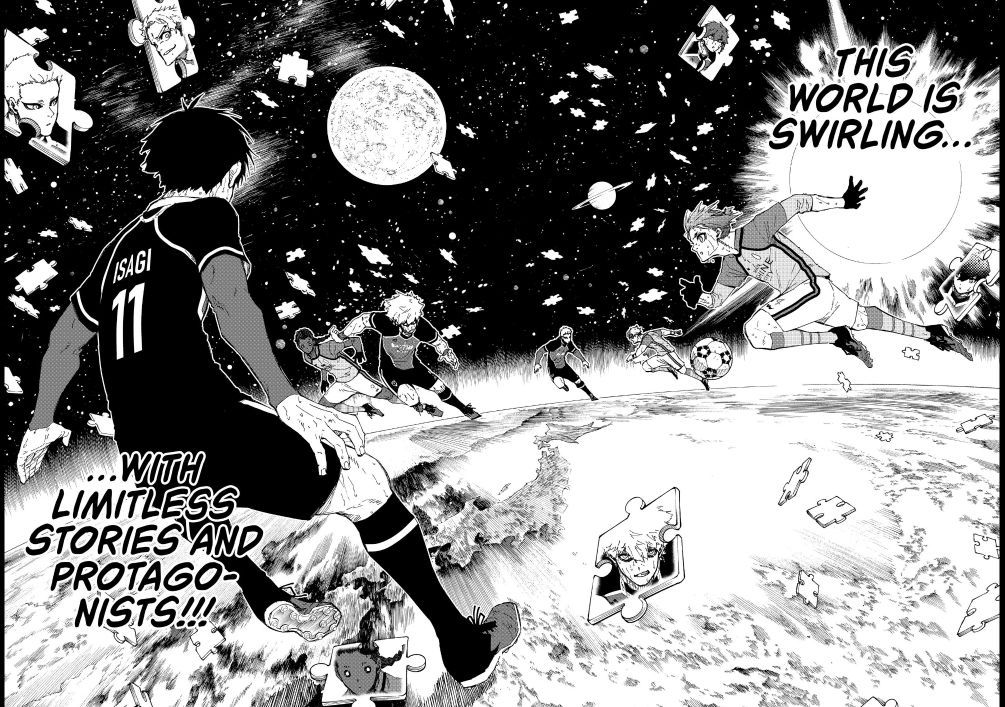The more I read Muneyuki Kaneshiro and Yusuke Nomura’s Blue Lock, the more I find this to be an interesting read on what it means to interact in the world if you feel that you’re a main character.
Spoilers for later volumes after the jump.
I’m up to the Neo Egotist League storyline (Volume 18 and onward) where every Blue Lock participant is placed among notable European teams to level up even further. Yoichi Isagi, our ever-evolving hero, joins Germany’s Bastard Munchen. He meets a even greater rival in his new teammate Michael Kaiser, an extremely arrogant player that is a next-generation talent whose skills make him an ace striker. In Bastard Munchen’s 2nd match inside Blue Lock with England’s Manshine City, Isagi notices how everyone involved in the game has a story in their mind and is trying to fulfill it. He realizes this after seeing Seishiro Nagi (who plays for Manshine City) proclaim that he feels like a protagonist after scoring a ridiculous goal. Isagi also learns this hard fact after trying to convince his teammate, Kenyu Yukimiya, to help him only for the latter to call him a selfish person who is no different from Kaiser.
Despite different goals and objectives, everyone is following their story and trusting in it with full mental strength to hopefully gain success – a “protagonist feeling” in the words of Isagi.
Last week, I read a great article on main character syndrome. It talks about how modern society (usually social media) pushes people to own their narrative. Go out there and be the hero. This is your story, after all. The world’s a stage and everyone else are just non-playable characters that are either in the way or helping you become worthy.
There’s, of course, problems with thinking you’re solely the main character when people are more than just NPCs. It isolates you from genuine connection with others and makes you unappreciative of what really matters in life. You start to base everything on getting external validation. Your focus is on competing with those around you over being noticed for all the wrong reasons.
Blue Lock’s creator, Jinpachi Ego, talks about this during the match. He talks about how Seishiro Nagi’s “protagonist” goal (which went viral) felt way too off because it couldn’t be reproduced. Ego believed the validation from fans watching the game can cause Nagi to become astray. He later talks about Yukimiya, who believes that God has chosen him to become a top-class striker with trials to overcome, but has serious limitations compared to the other players. Ego says to his assistant, Anri Teieri,
“There’ a difference between ‘confidence’ and ‘zealotry’, Anri-chan. What that idiot is doing is hopelessly trying to believe in a story where he’s the hero. Success never comes to those who are drunk in their own stories.”
Do you know what Blue Lock is composed of? My story of creating the world’s best striker, and your story of creating a World Cup victory, plus the stories of Japanese soccer fans wishing for that as well as the stories of the lumps of talent here. All of these stories intersect each other.
Success lies in the intersection between your story and others’.“
This sounds like what I read in the article about main character syndrome and the problems with it. Isagi begins to develop the “theory of mind,” something that people who think they’re the hero lack. It’s basically understanding that everyone has the same mental states as you. So yeah, everyone is literally a protagonist in Blue Lock.
Despite being an egotist, Isagi does a truly remarkable thing in deciding the match for Bastard Munchen against Manshine City. Instead of chasing his own goal to one-up Kaiser, Isagi defers to Yukimiya, who scores the winning goal, as a trump card strategy. Why? To prove to Kaiser that there’s someone who can out-perform him in a highly-competitive match with grand stakes. And that the ego can become interdependent with outside forces to make all egos happy.
Isagi becomes a even more respected person in the eyes of those who have a fondness for him because of his ability to process other people’s stories, not just his own. He’s willing to face uncertainty from outside factors even when he’s scared. This is what ACTUAL main characters are willing to do. They’re also more willing to learn and take advice and give back as needed.
When I think about those who managed to do okay despite trauma/adversity, it’s because they acknowledged how hard the world is at times and went against an ego that sometimes thinks it knows what’s good for you when it’s not. Sure, setbacks will happen, but they know it’s not the end.
Blue Lock may be about getting what you want out of something more than anyone else, but there’s always limits to the ego. The world won’t always give you what you want. When you don’t let the ego get inflated, things start to benefit everyone around you and circle back to you. To borrow a Blue Lock term, that’s when the meta vision starts to appear. You will see that everyone’s a story and learning shared commonalities from the stories of other people is what really gives you a meaningful victory worth celebrating and the validation you need to thrive in a field we all share and are interdependent on – life.
